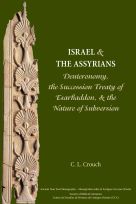Please use this identifier to cite or link to this item:
https://repositorio.uca.edu.ar/handle/123456789/7999| DC Field | Value | Language |
|---|---|---|
| dc.contributor.author | Crouch, Carly Lorraine | es |
| dc.coverage.spatial | ASIRIA | es |
| dc.coverage.spatial | ISRAEL | es |
| dc.date.accessioned | 2019-06-21T23:44:17Z | - |
| dc.date.available | 2019-06-21T23:44:17Z | - |
| dc.date.issued | 2014 | - |
| dc.identifier.citation | Crouch, C.L. Israel and the assyrians : Deuteronomy, the succession treaty of Esarhaddon, and the nature of subversion [en línea]. Ancient Near East Monographs - Monografías sobre el Antiguo Cercano Oriente, 8. Atlanta: Society of Biblical Literature; Pontificia Universidad Católica Argentina. Centro de Estudios de Historia del Antiguo Oriente, Universidad Católica Argentina, 2014. Disponible en: https://repositorio.uca.edu.ar/handle/123456789/7999 | es |
| dc.identifier.isbn | 978-1-62837-025-6 | - |
| dc.identifier.issn | N 978-1-62837-026-3 (online) | - |
| dc.identifier.uri | https://repositorio.uca.edu.ar/handle/123456789/7999 | - |
| dc.description.abstract | Introducción: The origins and purpose of the book of Deuteronomy remain, despite significant progress in the two centuries since de Wette, two of the most contested points in biblical scholarship. A prominent feature of attempts to ground the deuteronomic text in a historical context over the last half century has been the observation of certain affinities between Deuteronomy and ancient Near Eastern vassal treaties and loyalty oaths. More specifically, it has been suggested that the book of Deuteronomy, in some more or less original form, constituted a subversive appropriation of Neo-Assyrian imperial ideology in favor of a Yahwistic theocentricity: a text deliberately designed to undermine the authority of the Assyrian king by planting YHWH in his stead. The prevalence of this assertion has its roots in the widespread recognition of similarities between elements of Deuteronomy, especially chapters 13 and 28, and Assyrian vassal treaties and loyalty oaths, with a particular focus on the Succession Treaty of Esarhaddon, commonly referred to as VTE... | es |
| dc.format | application/pdf | es |
| dc.language.iso | eng | es |
| dc.publisher | Society of Biblical Literature | es |
| dc.publisher | Pontificia Universidad Católica Argentina. Centro de Estudios de Historia de Antiguo Oriente | es |
| dc.rights | Acceso Abierto | es |
| dc.rights.uri | https://creativecommons.org/licenses/by-nc-sa/4.0/ | es |
| dc.source | Crouch, C.L. Israel and the assyrians : Deuteronomy, the succession treaty of Esarhaddon, and the nature of subversion. Atlanta: Society of Biblical Literature; Pontificia Universidad Católica Argentina. Centro de Estudios de Historia del Antiguo Oriente, Universidad Católica Argentina, 2014 | es |
| dc.source | Ancient Near East Monographs - Monografías sobre el Antiguo Cercano Oriente. 2014, 8 | es |
| dc.subject | Esarhaddon, King of Assyria, -669 B.C. | es |
| dc.subject | Biblia. A.T. Deuteronomio | es |
| dc.subject | Biblia A.T. | es |
| dc.subject | ANTIGUO TESTAMENTO | es |
| dc.subject | RELIGION | es |
| dc.subject | LITERATURA ASIRO-BABILONICA | es |
| dc.subject | TRADICION | es |
| dc.subject | SUBVERSION | es |
| dc.subject | HISTORIA ANTIGUA | es |
| dc.title | Israel and the assyrians : Deuteronomy, the succession treaty of Esarhaddon, and the nature of subversion | es |
| dc.type | Libro | es |
| uca.path | Facultad de Ciencias Sociales|Departamento de Historia|Series monográficas | es |
| uca.disciplina | HISTORIA | es |
| uca.filename | /home/data-uca-generic/folder_facultad/Sociales/Dto. Historia/CEHAO/series monograficas/israel-assyrians-deuteronomy-succession/metadata.xml | es |
| uca.issnrd | 1 | es |
| uca.affiliation | Fil: Crouch, Carly Lorraine. University of Oxford; Inglaterra | es |
| uca.version | publishedVersion | es |
| item.fulltext | With Fulltext | - |
| item.languageiso639-1 | en | - |
| item.grantfulltext | open | - |
| Appears in Collections: | Series monográficas | |
Files in This Item:
| File | Description | Size | Format | |
|---|---|---|---|---|
| israel-assyrians-deuteronomy-succession.pdf | 1,37 MB | Adobe PDF |  View/Open |
Page view(s)
157
checked on Apr 30, 2024
Download(s)
580
checked on Apr 30, 2024
Google ScholarTM
Check
Altmetric
This item is licensed under a Creative Commons License

